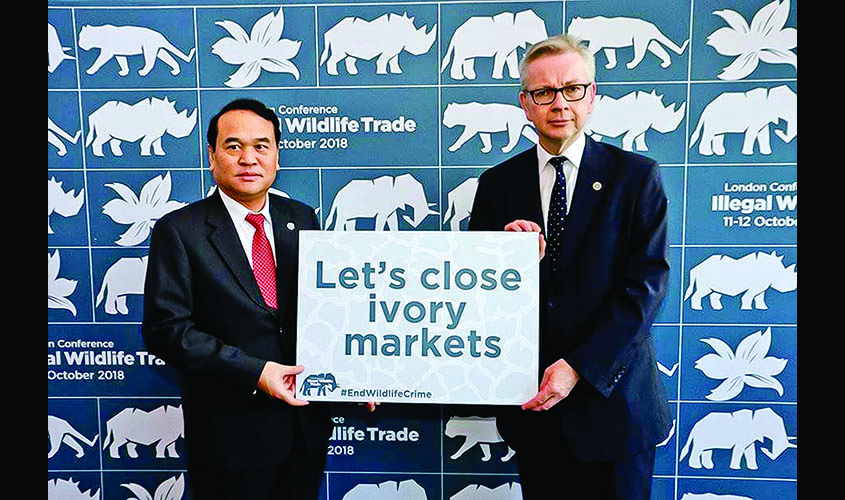In African countries, wildlife has been decimated during political struggles and criminal gangs enjoy protection from officials.
The UK Foreign Office hosted a two-day conference on illegal wildlife trade (IWT), appropriately held in the Evolution Centre in Battersea. Many Presidents and leaders from across Africa and Southeast Asia, plus delegates and stakeholders from 80 countries attended the conference. The trade in elephant, rhinoceros, big cat, pangolin, reptiles and multiple other species of fauna, birds and flora, is worth $17 billion-$23 billion. It is the fourth largest organised crime sector, devastating wildlife populations, national and local economies, even fuelling civil conflict and threatening national and regional security. Speakers feared that young children today may only know about elephants, giraffes, lions and pangolins from documentaries, because they will have become extinct in the next 20 years; other species are becoming endangered every year.
Foreign Secretary Jeremy Hunt said, “The World Bank estimates that governments lose as much as $15 billion every year because of illegal logging. And the same criminal networks that traffic the body parts of wild animals may also deal in guns and drugs and people.”
All agreed an international response to poachers and smugglers is needed. This abhorrent criminal trade crosses borders and is a sophisticated transnational crime requiring collective action from businesses, the private sector, the tech sector, NGOs, CITES (Convention on International Trade in Endangered Species of Wild Fauna and Flora), conservation organisations, scientists, police forces, game-rangers and anti-poaching rangers, Interpol and justice systems. The consensus was that penalties for the perpetrators must be much higher.
In certain African countries, wildlife has been decimated during political struggles and criminal gangs often enjoy protection from officials. President Ali Bongo Ondimba of Gabon said that IWT was a critical issue which had not been taken seriously enough. He recommended an international bill to allow joint investigative teams to share intelligence.

Regarding the human-elephants conflict, the importance of education and providing alternative jobs for local agrarian communities was emphasised. Pat Awori, Kenyan conservationist and a champion of elephants, explained, “The poverty mentality keeps people poor, farmers live hand to mouth, more than 60% would accept an alternative lifestyle to traditional farming. Kenya needs to have sustainable agriculture. If Kenya becomes industrialised why not assess land use and planning? Then decide where to keep wildlife and generate enough money to keep wildlife corridors. African nations/range states could come together and have range state meetings about how they could they support one another, prioritise and monitor.”
The necessity of changing behaviour patterns was recognised; a requirement to understand the drivers of illegal use; and for government-led change-behaviour campaigns to reduce the demand of illegally traded products is considered an essential step.
Zac Goldsmith MP and the government’s chosen “conference champion” told Bella Lack, youth ambassador for the Born Free Foundation, that Zimbabwe, Angola, Zambia, Namibia, Botswana were likely to create a corridor network of 50 million hectares. This would be the world’s largest nature reserve and home to the world’s largest population of elephants.
United States Attorney General Jeff Sessions declared that President Donald Trump would make it impossible for smugglers to have a safe haven in the US. He said poachers/smugglers would not able to flee from one nation to another to avoid prosecution. The US has deployed 12 wildlife attachés in embassies around the world. Sessions announced that the US would fund $90 million in counter-wildlife trafficking programmes and projects in the coming year.
Although India has a track record of poaching and wildlife trafficking, this reporter could not find an Indian representative to talk to at the conference.
Following the conference, 50 countries have adopted the London 2018 Declaration, making a political commitment to take action to protect endangered species around the globe and to close markets for illegally traded wildlife. More are expected to sign this landmark high-level international agreement in the coming days. Peru will host the first regional conference in Latin America focused on IWT in 2019.

